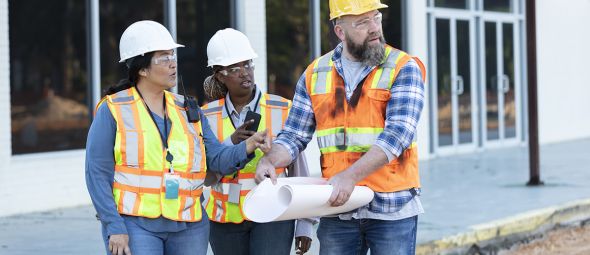
How Businesses Can Advance Manufacturing's Future through Collaboration with Workers
Join us on 12/18 for a virtual conversation on how innovations in job design and worker partnerships can help manufacturers meet business priorities, increase worker satisfaction, improve sustainability, and promote long-term business success.
Grantmaking and Partnerships
Led by a cross-sector Leadership Board that is ideologically diverse and representative of often-siloed groups, WorkRise invests in research on policies, programs, and practices that have the potential to accelerate economic security and mobility for low-wage workers. We fund analyses and the creation of data that shed light on labor market barriers, trends, and opportunities. And we engage in strategic partnerships that help advance evidence-based solutions in support of our mission. Learn more about our most recent request for proposals and how you can collaborate with WorkRise.
The Latest
In Depth

Worker voice, representation, and power
Feature
Last updated on October 24, 2024
Segregation in the Low-Wage Workforce
Over the past 50 years, the composition of the low-wage workforce has changed: more than half of low-wage workers are now people of color, up from just 20 percent in 1971. Today, Black, Latino, and women workers are more likely to be segregated into worse-quality and lower-paying jobs.
WorkRise Research

Employer practices
Last updated on November 19, 2024
Video
WorkRise Shorts: Overcoming Racial Disparities in Manufacturing Recruitment and Training Programs
Can a new local manufacturing workforce development program that targets workers who are not traditionally engaged in the sector overcome racial disparities in its hiring and wage rates?
Last updated on November 19, 2024
The Latest

Worker voice, representation, and power
February 20, 2024
Research Summary
The Racial Wealth Gap Is Smaller among Union Members
New evidence sheds light on the wealth of union households, finding greater wealth, higher pay, more benefits, and more stable employment for union members of color compared to their nonunionized counterparts.

Employer practices
February 27, 2024
Article
How Companies Can Modernize Their Approach to CSR: Strategies for a Successful Company, Workforce, and Society
This piece offers strategies to navigate the evolving landscape of corporate social responsibility in light of societal demands for more human-centered interventions.

Job search and matching
February 13, 2024
Research Summary
Minimum wages create opportunities for good jobs and better business productivity
Research on minimum wages in the United States finds that, contrary to frequent arguments against these policies, they often raise wages, moving low-wage workers into better jobs and benefiting companies’ productivity.

Job search and matching
February 06, 2024
Research Summary
The Digital Divide in Job Hunting
Socioeconomic factors and gaps in digital skills impact who uses social media to look for jobs. Older workers and low-income individuals are less likely to have the technological literacy or digital access to look for jobs online, while digital skills and use of social media across racial and ethnic groups are varied.
Research
Social determinants of work
Report
March 15, 2022
Implications of Providing Child Care Assistance to Parents In Education and Training
New WorkRise research uses microsimulation to model a hypothetical policy scenario where more parents in education and training were eligible for and received public child care subsidies.
Grantee Research
Social determinants of work
March 15, 2022
Expanding Child Care Subsidies to Parents in Education and Training
A fact sheet summarizes findings from a new WorkRise report that models a hypothetical policy scenario where more parents in education and training were eligible for and received public child care subsidies.
Grantee Research
Job search and matching
Executive Summary
January 14, 2022
Rise with the STARs
New research from WorkRise grantee Opportunity@Work demonstrates the harm and exclusion workers without four-year degrees who are “skilled through alternative routes” (STARs) experience in the labor market.
Grantee Research
Employer practices
Report
July 01, 2021
Skills, Degrees, and Labor Market Inequality
In a National Bureau of Economic Research working paper, researchers demonstrate that workers with college degrees have dramatically better access to higher-wage occupations where the skill requirements exceed the workers’ observed skill compared to workers without degrees.
Grantee Research
